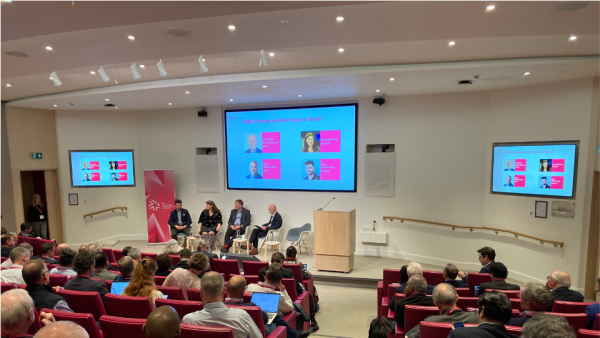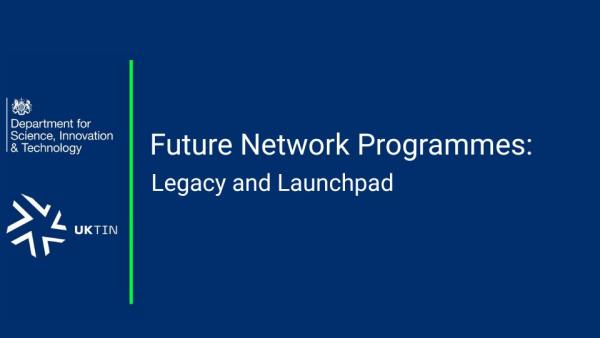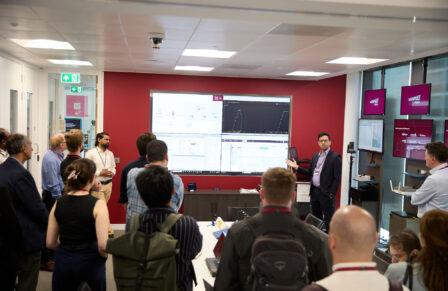Written by Kostas Katsaros

The rich complexity of the sector and speed of change mean ensuring collaboration across the various subdomains of our sector — in optical, wireless, space communications for example - remains a challenge.
The UK has enormous strengths in the sector, in industry and academia alike, and maximising these strengths is more important in the face of global and economic challenges to maintain a position of leadership.
With a shared strategy, and clear, cohesive roadmap for building future capabilities over the next 5-10 years, we firmly believe that the UK’s telecoms sector will reap the rewards of its full potential. This belief is at the core of UKTIN’s being. And we know that, like any good piece of infrastructure, whatever we build here must be built to last.
Following an open call for members and chairs put out last February, we have assembled nine expert working groups totalling 138 members, comprising experts in their fields — professors, patent holders, industry C suites, and new talents — from across the telecoms ecosystem in the UK. More than 65% of these experts come directly from industry, with members from start-ups and large corporates, while the remainder arrive from academia and the public sector. The volume, the expertise and the active engagement of the members — all of whom give their time on a voluntary basis — is testament to the desire and need for such an undertaking.
So far, these groups have penned and published Future Capability reports covering wireless, AI, security, non-terrestrial networking, network management and semiconductors, which include more than 50 recommendations for potential interventions. Industry and academic perspectives are covered in equal measure, with analyses of market conditions, the regulatory space, skills requirements, R&D capabilities, and technology-specific queries pertaining to each focus area. Production of these independent and impartial reports has been iterative and consultative, with the Wireless Networking, AI, Security and NTN Groups, for example, hosting events to test-run and share their findings — before refining them in later drafts and gathering recommendations for future papers. Forthcoming reports focused on optics and core networking technologies are currently under review, and will be published before the summer this year.
The Future Capability papers are written with a focus on the sector’s needs and opportunities, enabling them to be understood and to be acted on. The contents of the papers feed directly into regular reviews with the Department for Science, Innovation and Technology, and recommendations are presented in a way that makes sense to both telecommunication sector and policymakers alike. Industry leaders, academics and taxpayers alike benefit from government interventions which are well grounded in evidence; this is our opportunity to make a significant contribution by harnessing, in a systematic way, the collective intelligence and insights of the ecosystem.
The UKTIN working groups are structured around specific areas of expertise — wireless, semiconductors, optics, AI, and so on — and funnel up, through industry and academia, to a single, strategic group that we’re calling the Future Capabilities Strategic Forum. This umbrella forum is positioned to provide an overall vision of the strengths, weaknesses, and future potential of UK telecoms as a whole. The UKTIN groups work on a long-term view, aiming to inform strategic objectives for the UK based on predictions for the next five to ten years, from 2025-2035 — and how and where the UK could grow its capabilities to address the realities of 2035 and beyond.
Encouragingly, we are already beginning to see common recommendations for supporting the sector emerging from the different Future Capability papers. This bodes well for supporting a future roadmap which is not only cohesive but actionable and achievable. This will be crucial to continuing to address the fragmentation that can hamper the telecoms sector. The first stage of achieving this goal is almost complete, with the publication of the initial Future Capability papers. These stage one reports will be revisited over the course of the next 12 months for a second release in early 2025, which will work to a more specific focus on the technical R&D roadmap and requirement for building new capabilities in the UK. The focus will shift from past and present states of play, to future opportunities.
UKTIN’s expert working groups provide a voice of the telecoms ecosystem. But they do more than just talk. What we are already finding is that the working groups are producing outputs that go well beyond the scope of their initial briefs: for example producing historical accounts of the development of the telecoms sector and its component technologies, covering the past three decades in a way that hasn’t been done before.
By the close of this pivotal project in March 2025, the UKTIN working groups will have supported the co-creation of a shared telecoms roadmap for the UK for the next 5-10 years — one in which industry, academia, and government, pulling in the same direction, might all have a stake in. As a result we’ll all have the chance of a bright UK telecoms future to believe in.
What’s coming next:
- Optical, core networking and standards future capability papers to be published by the end of Summer 2024
- Strategic groups will review the papers and publish their cross-theme recommendations
- The Expert Working Groups will commence and ultimately publish their second papers, adopting a more future-focused view
Read the Future Capability Papers published so far and their recommendations









